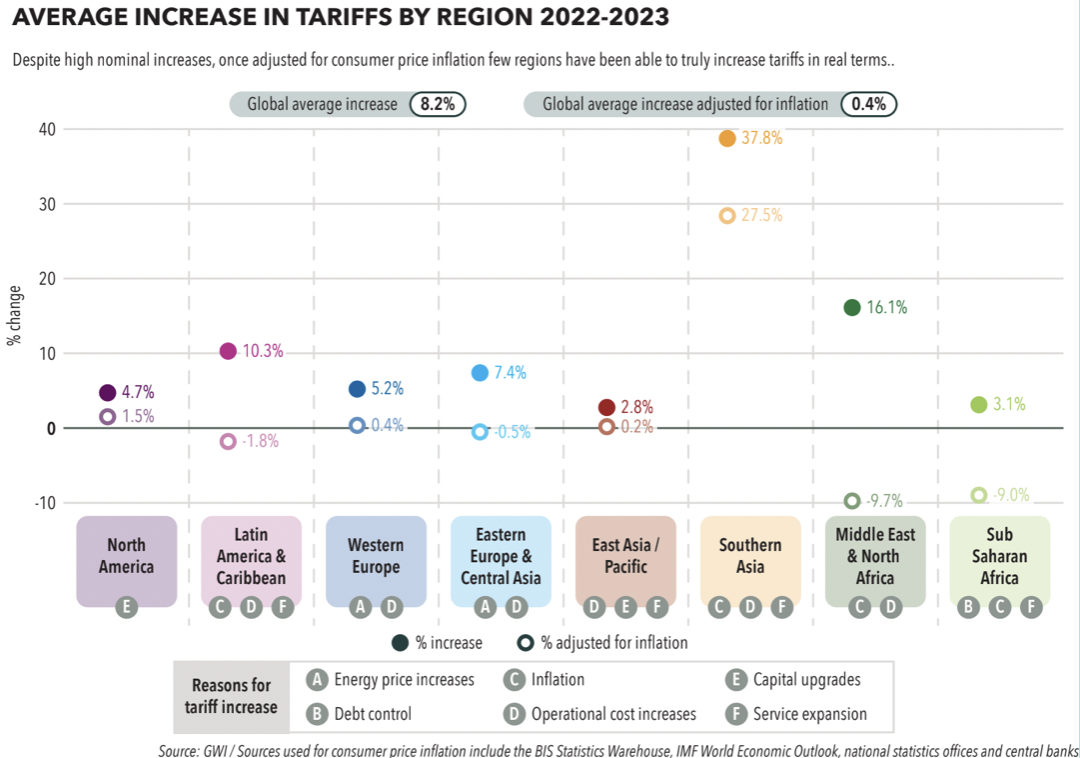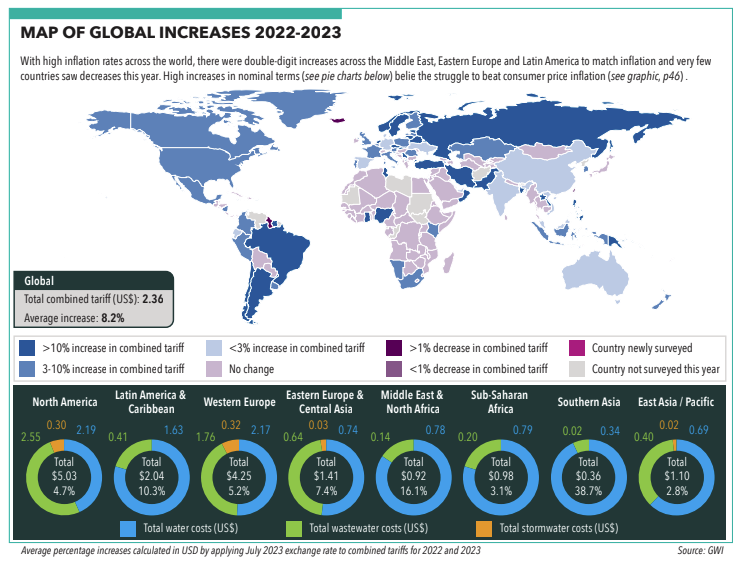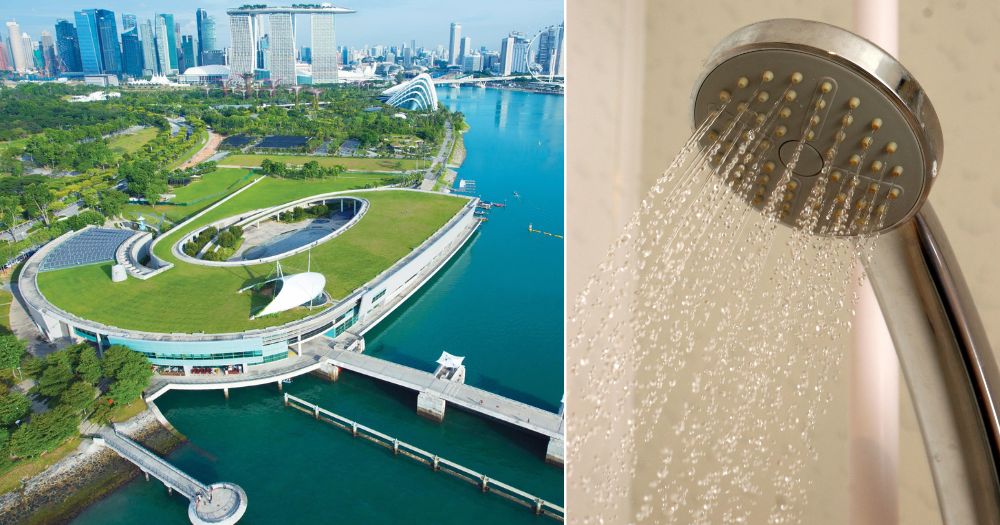Water prices in Singapore will be increased by 50 cents per cubic metre over the next two years, as previously announced by national water agency PUB on Sep. 27, 2023.
But why are water prices increasing? Why now and not later?
How much exactly are water prices increasing?
The price increase will be implemented in two phases, with a smaller increase of 20 cents per cubic metre from Apr. 1, 2024, followed by an increase of 30 cents per cubic metre from Apr. 1, 2025.
This would represent an increase in water price of about 2.5 per cent per year since the last price revision in 2017.
To put in numbers, an average HDB household, which consumes about 15 cubic metres of water per month, can expect an increase of S$7 a month in their water bill with the full price increase.
The water bill accounts for less than a third of the average utility bill.
How is water priced?
Simply put, in Singapore, water is priced to recover the full cost of its supply and production, and to reflect the cost of producing the next drop of water, which comes from desalination and NEWater plants.
The water tariff, the Water Conservation Tax and the Waterborne Tax are also factored into water prices.
Why is the water price increase necessary?
According to PUB, the revision in water prices reflects the rising costs of producing and supplying water since the last water price revision in 2017.
Imminent challenges
Specifically, the cost to build, operate, and maintain Singapore's water system has increased.
For instance, the open market tariff for electricity has gone up by 37 per cent, while the expenses for chemicals have increased by 33 per cent.
Construction costs based on Building and Construction Authority's (BCA) Tender Price Index has risen by 35 per cent.
The chemical expenses for water treatment have increased by 33 per cent while the maintenance costs have increased by 18 per cent due to higher manpower costs for contracted services.
Investments to tackle future challenges
Additionally, PUB also needs continual investment to maintain a sustainable water supply for Singapore.
Over the past five years, the agency has invested more than S$3 billion in key long-term investments, especially in weather resilience sources such as NEWater and desalination infrastructure.
These investments include adding three desalination plants in Tuas, Marina East, and Jurong Island since 2017, bringing the total to five desalination plants today.
PUB has also renewed 310km of pipelines since 2017. Currently, the agency maintains over 6,600km of pipeline network and will be adding new pipelines to support the needs of new residential areas such as Tengah and Bidadari.
On top of that, the agency will continue to upgrade ageing local water treatment plants.
Lastly, PUB is completing the Deep Tunnel Sewerage System, and expanding used water and NEWater infrastructure at Changi, Tuas and Kranji to meet Singapore's long term water demand.
Why must it be now? Can we defer the water price increase?
Currently, the total cost of producing and supplying water already exceeds water prices due to external cost pressures over the past few years.
Deferring the increase will only mean higher, more significant hikes in the near future.
"The price increase at this point will enable PUB to sustain its operations and maintain existing assets to deliver high-quality and reliable water supply and used water services.
It will also allow us to support critical investments in water infrastructure to ensure water security for Singapore, amidst the challenges of climate change and water demand growth," said the agency.
Why split the increase into two phases?
The increase in water prices is split into two phases with a smaller increase in the first year to allow households and businesses to adjust to the price increase and allow more time for people to adopt water conservation measures.
Water prices increase in many cities that face cost pressures
Singapore is not the only country whose water utilities are facing cost pressures due to factors such as higher electricity prices and rising capital costs in upgrading ageing assets as well as improving reliability in service delivery.
According to this year's Global Water Tariff Survey conducted by Global Water Intelligence (GWI), many cities around the world have implemented significant increases in water prices to cope with these cost pressures as a result of high inflation.
In fact, between July 2022 and July 2023, the average yearly increase in the combined water, wastewater, and stormwater bill hit a record-high of 8.2 per cent globally. In comparison, Singapore's increase in water price will mean about 2.5 per cent increase per year since the last price revision in 2017.
 Graph by Global Water Intelligence.
Graph by Global Water Intelligence.
 Screenshot via Global Water Intelligence
Screenshot via Global Water Intelligence
By pricing water right, it also encourages water conservation by households and industries, to achieve a sustainable growth in water demand
Will we expect more frequent water price increases in the future?
As PUB reviews the water price regularly to ensure the right pricing of water, the need to revise water prices would depend on both annual operating costs as well as long-term investments in water infrastructure.
PUB expects operating costs, which are affected by external factors, to remain elevated.
Nevertheless, the agency will proactively implement cost management measures to manage the cost of producing and supplying water:
"Over the long-term, PUB is investing in Research and Development on new technology as well as process innovation to target our key cost drivers. These efforts serve to manage the growth in long-term costs on a sustainable trajectory, even as we need to renew and expand our water system.
Our long-term water infrastructure plans also affect the level of investments required. These plans are reviewed periodically, in line with updates to national projections for population and economic growth, as well as land use changes."
What kind of financial support can we expect from the government?
To help mitigate the impact of the increase in water price, along with other cost of living concerns, the government will provide additional financial support, especially for lower- and middle-income households.
The support will be announced by the Ministry of Finance soon, according to PUB.
Businesses can tap on PUB's Water Efficiency Fund (WEF) for support to manage their water demand and save money from lowering the amount of water they need to use.
Top image via Canva and PUB/Facebook
This article powered by Airalo's 10GB e-SIMs allows us to stay connected with our audience 24/7.
If you like what you read, follow us on Facebook, Instagram, Twitter and Telegram to get the latest updates.



